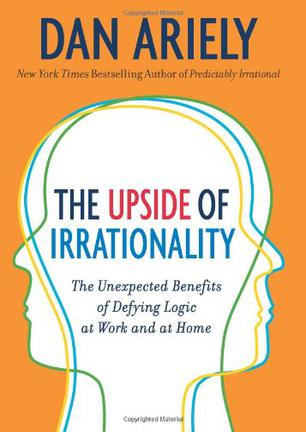目录
Introduction Lessons from Procrastination and Medical Side Effects 1
Hepatitis and procrastination
The movie treatment
What we should do and behavioral economics
From food to incompatible design
Taking irrationality into account
Part I THE UNEXPECTED WAYS WE DEFY LOGIC AT WORK
Chapter 1 Paying More for Less: Why Big Bonuses Don't Always Work 17
Of mice and men, or how high stakes affect rats and bankers
Measuring the effects of a CEO-sized bonus in India
Loss aversion: why bonuses aren't really bonuses
Working under stress: just how clutch are "clutch" NBA players?
Stage fright and the social side of high stakes
Making compensation work for society
Chapter 2 The Meaning of Labor: What Legos Can Teach Us about the Joy of Work 53
You are what you do: identity and labor
The pains of wasted work
Lessons from a parrot---and some hungry rats
Searching for meaning while playing with Legos
Making work matter again
Chapter 3 The IKEA Effect: Why We Overvalue What We Make 83
Why IKEA makes us blush (with pride)
Cooking lessons: finding a balance between just adding water and baking an apple pie from scratch
The real value of a thousand origami cranes (and frogs)
Customize it!
Why "almost done" doesn't do much for us
Why we need labors of love
Chapter 4 The Not-Invented-Here Bias: Why "My" Ideas Are Better than "Yours" 107
Mark Twain describes a universal form of stupidity
"Anything you can do I can do better": why we favor our own ideas
The toothbrush theory
What we can learn from Edison's mistake 7
Chapter 5 The Case for Revenge: What Makes Us Seek Justice? 123
The joys of payback
The bailouts and pounds of flesh
One man's quest for revenge against Audi
The etiquette of revenge
Companies beware: when consumers go public
Uses and misuses of revenge
Making amends
Part II THE UNEXPECTED WAYS WE DEFY LOGIC AT HOME
Chapter 6 On Adaptation: Why We Get Used to Things (but Not All Things, and Not Always) 157
Frogs: to boil or not to boil?
Adapting to visual cues and pain thresholds
Hedonic adaptation: from houses to spouses and beyond
How the hedonic treadmill keeps us buying---and buying more
How we can break and enhance adaptation
Making our adaptability work for us
Chapter 7 Hot or Not? Adaptation, Assortative Mating, and the Beauty Market 191
A personal adaptation
When mind and body don't get along
Sticking to our own (more or less hot) kind in dating: do we settle or adapt?
Let's ask the Internet: dating sites and romantic criteria
How I met your mother
Chapter 8 When a Market Fails: An Example from Online Dating 213
The function of the yenta
The dysfunctional singles market (as if you didn't already know)
The difference between your date and a digital camera
An exemplary failure in dating
How dating sites skew our perceptions
Ideas for a better dating future
Chapter 9 On Empathy and Emotion: Why We Respond to One Person Who Needs Help but Not to Many 237
Baby Jessica versus the Rwandan genocide
The difference between an individual and a statistic
Identification: needed for more than buying beer
How the American Cancer Society reels us in
The effect of rational thinking on giving
Overcoming our inability to confront big problems
Chapter 10 The Long-Term Effects of Short-Term Emotions: Why We Shouldn't Act on Our Negative Feelings 257
Don't tread on me: my colleague learns a lesson about rudeness
The dark side of impulses
Deciding under the influence (of emotions)
The importance of "irrelevant" emotions
What a canoe can tell you about your love life
Chapter 11 Lessons from Our Irrationalities: Why We Need to Test Everything 281
A decision about life and limb
Gideon's biblical empiricism
The wisdom of leeches
Lessons learned, hopefully
Thanks 297
List of Collaborators 299
Notes 305
Bibliography and Additional Readings 307
Index 319
【展开】
【收起】
内容简介
The provocative follow-up to the New York Times bestseller Predictably Irrational
Why can large bonuses make CEOs less productive?
How can confusing directions actually help us?
Why is revenge so important to us?
Why is there such a big difference between what we think will make us happy and what really makes us happy?
In his groundbreaking book Predictably Irrational, social scientist Dan Ariely revealed the multiple biases that lead us into making unwise decisions. Now, in The Upside of Irrationality, he exposes the surprising negative and positive effects irrationality can have on our lives. Focusing on our behaviors at work and in relationships, he offers new insights and eye-opening truths about what really motivates us on the job, how one unwise action can become a long-term habit, how we learn to love the ones we're with, and more.
Drawing on the same experimental methods that made Predictably Irrational one of the most talked-about bestsellers of the past few years, Ariely uses data from his own original and entertaining experiments to draw arresting conclusions about how—and why—we behave the way we do. From our office attitudes, to our romantic relationships, to our search for purpose in life, Ariely explains how to break through our negative patterns of thought and behavior to make better decisions. The Upside of Irrationality will change the way we see ourselves at work and at home—and cast our irrational behaviors in a more nuanced light.
【展开】
【收起】
下载说明
1、追日是作者栎年创作的原创作品,下载链接均为网友上传的的网盘链接!
2、相识电子书提供优质免费的txt、pdf等下载链接,所有电子书均为完整版!
下载链接
